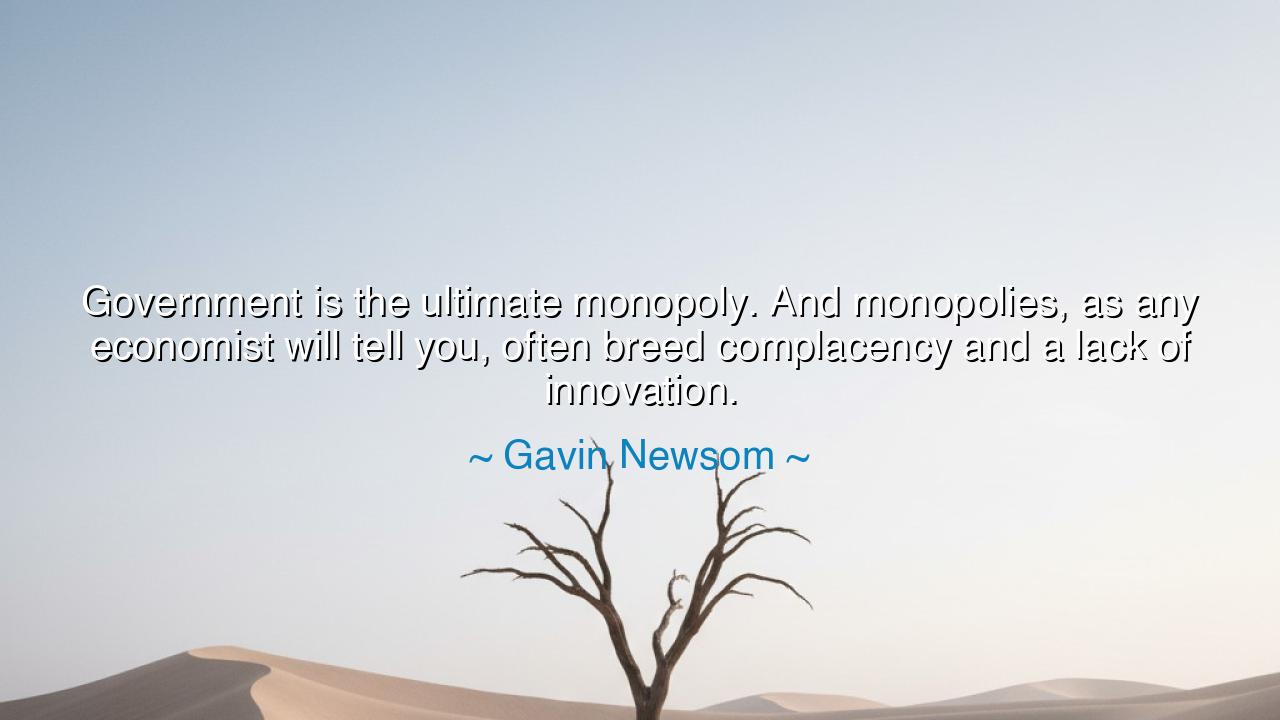
Government is the ultimate monopoly. And monopolies, as any
Government is the ultimate monopoly. And monopolies, as any economist will tell you, often breed complacency and a lack of innovation.






"Government is the ultimate monopoly. And monopolies, as any economist will tell you, often breed complacency and a lack of innovation." – Gavin Newsom
In these sharp and reflective words, Gavin Newsom, Governor of California, warns of a danger that has haunted every civilization since the dawn of organized power: the monopoly of authority. He calls government the “ultimate monopoly,” not to condemn its existence, but to expose the peril that arises when a single institution holds all the levers of decision, control, and enforcement. In the world of markets, monopolies kill competition; in the realm of governance, they suffocate progress. Newsom’s insight, though spoken in modern language, is ancient in spirit—it echoes the wisdom of philosophers who warned that unchecked power dulls virtue and weakens creativity.
The origin of this quote lies in the tension between government’s noble purpose and its inevitable temptation toward control. Newsom, a leader shaped by both public service and private enterprise, has often spoken about the need to reform bureaucratic systems that become slow, wasteful, and resistant to change. He understands that government, like a monopoly, can become so secure in its power that it forgets the people it was meant to serve. The irony, he suggests, is that an institution designed to protect freedom can, if unchallenged, deaden the very spirit of innovation that freedom requires.
This idea has deep roots in the history of governance. From the empires of Rome and China to the bureaucracies of modern nations, every government that has grown too powerful has also grown complacent. When there are no competitors, no accountability, and no fear of failure, systems ossify. The Roman Empire, once a model of engineering and administration, became rigid and corrupt as its power centralized. Officials clung to procedure instead of progress, taxation replaced inspiration, and innovation gave way to inertia. The same principle applies to every age: absolute control breeds stagnation, whether in an emperor’s palace or a modern parliament.
Newsom’s warning is not a cry against government itself—it is a call for renewal through competition, creativity, and transparency. He recognizes that the problem is not the existence of authority, but the loss of accountability within it. When citizens stop demanding excellence, when bureaucracy grows beyond the grasp of reform, when the comfort of power replaces the hunger to serve, government ceases to be a living force and becomes a fossil of its former self. The monopoly of power, like the monopoly of commerce, begins with the promise of efficiency but ends with the rot of arrogance.
History offers shining contrasts. Consider the United States during the space race. Though government-led, NASA thrived because it faced fierce competition—not from within, but from the Soviet Union. That rivalry ignited a fire of creativity that propelled humanity to the moon. Yet decades later, when the spirit of competition faded, space exploration slowed. Only when private innovators—SpaceX, Blue Origin, and others—entered the field did the flame rekindle. The lesson is eternal: progress is born from challenge, and stagnation from monopoly.
In a deeper sense, Newsom’s words speak not only to governments, but to all human institutions. Every organization—be it a business, a church, or a family—risks decay when it believes itself beyond question. Complacency is the shadow of comfort. The wise ruler, the wise citizen, and the wise worker all know that self-satisfaction is the beginning of decline. Like a garden untended, even the most noble system will grow weeds of inefficiency if not constantly renewed by the sunlight of scrutiny and the rain of reform.
The lesson, then, is clear and enduring: every form of power, no matter how righteous its origin, must remain humble before its purpose. The cure for monopoly is participation; the cure for complacency is accountability. A government that listens, learns, and evolves is one that truly serves its people. But a government that assumes its own perfection will soon find itself ruling ruins.
And so, the practical actions are these: question authority not to destroy it, but to refine it. Demand transparency from leaders, innovation from institutions, and responsibility from yourself. Support systems that encourage diversity of ideas and decentralization of power. For as Gavin Newsom reminds us, government is the ultimate monopoly—and only through the courage to challenge it can the flame of progress continue to burn brightly through the ages.






AAdministratorAdministrator
Welcome, honored guests. Please leave a comment, we will respond soon